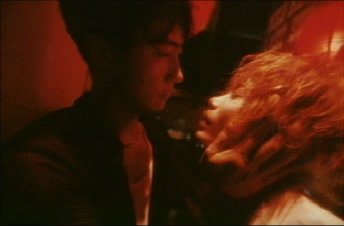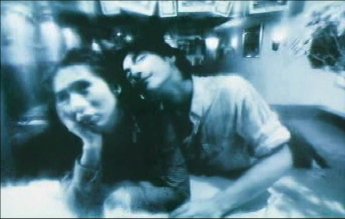|
Text and layout © Ed Shum, 2003. Ed Shum asserts the moral right to be identified as the author of this work |
|
Long Reviews |
|
Yet there is also an uncomfortable acknowledgement that we are shorn from the moral justifications which usually attend heroic bloodshed - Leon is more emotionally detached from his actions than we are, thanks to technique - and so we experience the violence free from any moral point, without being shielded behind a character’s justifications. What WKW does is to subtly draw the viewer into the actions of violence which are so inevitable: somehow the leering victims-to-be of the very first hit are genre-marked for death. But in the end we know not why they are dead - we can’t assume a moral reasoning. This amoral approach is developed in that there is even less attempt to justify later hits. WKW therefore avoids the moral issue near completely, which is actually a strength: his films generate drama by distilled emotion that is not based on a layer of morality masquerading as objective values - the emotion generated in his films seems to have a deeper source in the experience of existence itself. In the end, his characters’ dilemmas are based around very personal experiences which seldom result in attempts to look for objectively ‘right’ decisions. It is in his final monologue that Leon tells us that he doesn’t know if his decision is right or wrong, it is his decision. |
|
Review of Fallen Angels (1995) |
|
|
|
...Continued... [Page 2] |
|
End |
|
Despite the physical separation of Michelle and Leon, the connection which the film makes between them is so powerful that one might never notice how they barely ever meet. Their scenes share technical characteristics, themes and moods. Most prominently, they frequent the same places: something which the film plays on, for example, in the scene when she scouts out the location of his next hit, the editing mixing shots of him actually carrying out the hit as if they were present contemporaneously. In contrast, Karen Mok’s bleach blonde ‘Baby’ - a forever active, and energetic, crazed pixie-like character - appears little more than an appendage to Leon’s scenes. Her zany energy cannot be requited by Leon, and in the end she is tragically out of joint in the scene when Leon actually meets Michelle. The much vaunted meeting is largely kept off camera as we instead see Karen whooping and dancing, apparently in joy, but ultimately alone. Finally, when we see the meeting between Leon and Michelle, little more happens than at the start of the film - the setting is somehow more real and in context, but the result negative and more painful given how tantalisingly close the film has managed to depict both. This is surprising when one considers just how unlikely the premise is, and how self-consciously WKW puts this right at the beginning of the film, challenging viewers to reject involvement altogether. But in the end he manages to create an emotional tapestry irrespective of factual context: and this powerful empathy connects with the viewer. |
|
The second story to start has Takeshi Kaneshiro playing a mute who spends the nights frequenting the streets of Hong Kong, breaking into people’s businesses, not to steal from them, but to assail passers-by with compulsory commerce. As one can probably tell, Takeshi’s story is funny. Some found the humour too much for their ‘art’ sensitivities, but those who maintain an open mind as to how a movie can entertain and move, without the need for constantly locking the mind into an artificial ‘art’ mind-set, will find Takeshi’s story not only fun, but also, ultimately, moving in a manner which is simply undeniable. |
|
Essentially, Takeshi’s role is the flip-side of his Chungking character, starting with the same monologue (‘We rub shoulders with people everyday... perhaps one day we could be friends...’), but this time he is a law-breaker, a denizen of Hong Kong’s dispossessed, surviving by petty crime. But WKW doesn’t concentrate on the sadness of his society, in the same way that he doesn’t concentrate on the morality of Leon’s profession. This trait is essential WKW, frustrating for some, but for others, like myself, it is what is refreshing about his films. Instead, his escapades are presented on the surface by the vehicle of the slapstick comedy genre. ‘Vehicle’ is perhaps too distant a way of putting things when the comedy is very much prominent, like when Takeshi’s ‘favourite’ customer returns for a snack, and ends up begging not to be the first person in Hong Kong to ‘die by ice cream’: a hilarious sequence. But again, WKW never allows us to relax into prejudging tone by reference to what we know of genre and convention - every so often he provides a little aside or snippet which hints at something darker, going beyond making us laugh to reminding us of how a tone is malleable and never to be taken for granted. For example, at the end of the ice cream scene, just after expressing his belief that the family he has abducted are having the ‘most fun they’ve had for a long time’, Takeshi gives a throwaway remark that his mother was killed by an ice cream van. To WKW’s credit, he never expands on this fact, and the narrative never mentions it again - it isn’t of real importance in terms of narrative - in fact we are left unsure if it is even true. The reason we are unsure is because we, as viewers, are accustomed to being shown what is supposed to be important, what is significant for the narrative and the characters, and this is something which WKW plays against by making the remark so insignificant and minimal. Yet we take the words on board because they are so instantly tragic and ironic. And so, by the mere addition of the remark we find that our recollection of Takeshi’s ice cream escapade is flipped over from being pure hilarity to possessing a tinge of sadness. Once again, we see that by pure technique WKW has controlled the mood of the film independent of what is actually occurring on the narrative level. |
|
The end of the affair: Karen Mok’s character ceases bouncing around when it finally dawns on her that she has merely been a side-show to the central relationship. This is not treated with derision though - Leon rationalises their affair as a stop on a journey rather than a final destination: in the end, only his character has a finality - a tragic one, but borne out of his own free choice |
|
By using a light-hearted surface for Takeshi’s story, WKW manages to insert material without explanation, in a manner which doesn’t feel alien. This is because much of the happenings chronicled in Takeshi’s story are presented in a manner which is surreal and, apparently barely coherent at times. Compared to the careful crafting of Leon’s situation, Takeshi’s is playful to the point of what seems like irresponsibility. But in context, the intricate emotional contrivances of Leon’s story are well balanced by the gleefully perverse tragi-comedy of Takeshi’s existence. Somewhere along the line, he meets a manic Charlie Young on the rebound from another relationship. Developing from being her shoulder to cry on, he attains something like the ‘appendage’ status that Karen Mok has with Leon. Together, their escapades reach levels of illogicality that many critics found unpalatable. However, there is an undeniable joy in seeing a manic playfulness building up to Takeshi’s belief that he has found love. But continually in this, we are shown that Charlie’s mind is elsewhere: there is an entire sequence where they hunt the ‘Blondie’ who has taken her lover (or so we’re told by Charlie: we never see Blondie). On a metaphorical level, there is a point blank (though deliberately unserious) parallel to the political realities Hong Kong faced - explicitly recalled in the cafe scene where Charlie tries to draft a contract for Blondie to give up, and ‘handover’ her lover. The irony in that scene is that everyone ends up trying to hunt ‘Blondie’ - all accusing each other of being the much sought after figure. Like the preceding scene, where a blow-up doll is the vent for frustration and violence, the cafe scene ends in a brawl: which WKW handles in a playful tone rather than melodramatically. |
|
Page: |
|
Page: |

|
Many rivers to cross: we are taken along with Takeshi’s roller-coaster emotions as he believes he has found love. Even though he is misguided, the ultra-subjective viewpoint allows us to feel the force of his emotions (even if they aren’t matched by anyone else’s), sometimes displayed with a lyricism more powerful and simple than words can convey |
